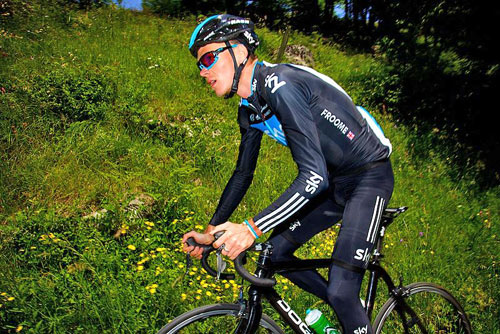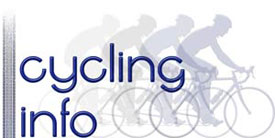It’s the week before the Tour de France and we have a whole week with no cycling on tele, just hours of speculation about the riders, the course and different possible outcomes. It’s that time of the year when journalists are desperately looking out for some tibit or quote to fill the press pages.

Chris Froome says ‘he’s feeling good’ and 100 journalists worry this might be the most boring tour since, er. last year. Contador mentions he’s checking out the local steakhouses, and hopes of an epic encounter on the top of Alpe d’Huez suddenly rise.
On the positive side, at least we are spared the whole Team Sky leadership soap opera saga. Thankfully, that has been put to bed.
Even if Wiggins had not won the Tour de France, he would still have been one of Britain’s most successful cyclists ever. But he did win, plus an iconic Olympic gold to boot. 2012 was all about Bradley Wiggins. But, in sport there is no room for sentiment. This year Wiggins, will be probably watching from a pub in Wigan or training for the Tour of Poland. The man of the moment is unquestionably Chris Froome. The Spider himself, the Kenyan born Brit with tremendous climbing talent. ‘Froome dog’ the loyal lieutenant (well mostly loyal apart from the odd glimpse of showing off in mountains)
But, who is Chris Froome? Where did he come from? and what kind of person is he?
Va Va Froome by David Sharp review
This books tells Froome’s development as a rider from the dusty mountain roads of Kenya to the top of the European pro scene.
Froome’s background is quite interesting. His earliest cycling days were with a group of poor native Kenyans who were oblivious of European road racing, but just enjoying the chance to actually ride a bike. From these lonely Kenyan beginnings, Froome moved to the opposite extreme – the privilege of South Africa’s top boarding school – giving Froome a strange mix of backgrounds from knowledge of the poverty of the Masai Mara to an accent of privilege. Unsurprisingly, cycling was not seen as a proper sport at Froome’s South African school, though some reminisce of seeing Froome put in 3 hours on an indoor turbo trainer. Froome’s dedication was evident from the early days.
From these beginnings we see a potted history of an aspiring neo pro. It was no meteoric rise, but his talent for long climbs was soon apparent. It may be hard to imagine, when Froome is sitting in a well oiled Team Sky winning-cycling machine, but his early years as a pro were fraught with self-imposed disasters.
Like one of his first U-23 world time trial championships where he just rode into a marshal by mistake. It may be funny now, but the marshal had quite a few bruises at the time. Then there was the time when he was on the verge of his first pro win. In the last km he thought he had a three minute gap, 200 metres from the line, he sits up, does up his zip all ready to show his sponsor in full colours. But, as Froome is grinding to a slow victory march, the bunch come flying past – nearly crashing in to the relatively stationary Froome. For a pro cyclist, there are few things more embarrassing than the victory celebration that proves to be premature.
The book starts with recapturing the ‘battle’ between Froome and Wiggins in the 2012 tour. The chapter is told well, but it also highlights a weakness of the book – this 2012 chapter will soon feel of much less importance after the 2013 tour. Froome is a man on the mission, and this book only tells the first half of the story. It’s like writing a book about man visiting the moon, but the book stops just as you get to the launch pad.
However, I’m sure future editions will be updated for 2013 tour and beyond. The important thing is that this book gives a good and detailed account of the less widely known aspects of the Froome story. If Froome wins in 2013, you won’t need a specialist book to find out about it. But, I learnt a lot about the nature of Froome’s character and was fascinated to see how a cyclist can make his way through the pro-ranks.
Another aspect of the book is that it relies on testimonies of people who knew Froome and quotes from Froome in the cycling press. There appears to have been little direct access. Froome is a guarded treasure now. But, that isn’t a bar to telling a detailed story.
For those who think Froome comes across as a little bland and robotic, you will enjoy reading about his rather unconventional introduction to pro-cycling. His initial dodgy descending skills, his preference to go it alone and do 6 or 7 hour training rides.
A short note on doping. This book is not a doping investigation. It merely presents a fair overview of Froome’s life and career so far. On a personal note, I feel Froome is an athlete you can believe in. From what he says and what he has done, I will assume he is a clean athlete. People can come to their own conclusions. But, this does appear to be a different era to L.A. and Tyler Hamilton e.t.c.
Overall
I was really glad to get the book, and read it quite quickly. It fills in many gaps about the early career of Froome. It will appear more to a fan keen on pro-racing. There is a lot of details about races – who won, how Froome did. If you’re looking for an in depth psychological analysis backed up by an in depth interview, you will be disappointed. But, I liked the book, just because I was interested to know a bit more about Froome’s training, what makes him tick. It’s also quite inspiring to see how he was moulded from two unlikely sources – the wilderness of the Masai Mara, and the privilege of a South African boarding school which turned its nose up at cycling.
as they say in ‘va va Froome dog!’ now you just have to go and win the tour!
photo: M.Cound
Buy
- Va Va Froome by David Sharp at Amazon.co.uk
related

Brian Bruns has an excellent book about RAGBRAI, it can get you through until the Tour starts! It’s about RAGBRAI, that’s intense as well. But it’s a funny look at it, not so serious which ais good at times! Here’s his site, http://www.briandavidbruns.com/BDB/Rumble.html, has a little excerpt on there, it can easily help you pass the time!